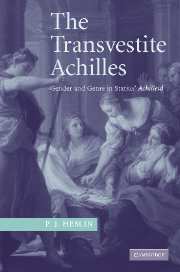Book contents
4 - Semivir, Semifer, Semideus
Published online by Cambridge University Press: 29 October 2009
Summary
ό δέ μὴ δυνάμενοϛ χοινωνειν ἢ μηδέν δεόμενοϛ δι αὐτάρχειαν οὐθέν μέροϛ πόλεωϛ ἢ ὥστε ἢ θηριον ἢ θεόϛ
Aristotle, PoliticsIf the preceding chapter seemed to suggest that the Achilleid is more about Thetis than Achilles, that conclusion would not be far wrong. It has been claimed that the poem that we have could more accurately be called a Thetideid than an Achilleid. Thetis has more than twice as many lines of direct speech as the next most voluble character in Book 1. Despite his sometimes passive role, this is nevertheless a story about Achilles, and it is to the early origins of the hero that we now turn. What distinguishes him most in Statius' characterization is that his position in the world is liminal, still uncertain. The clearest example of this is his shifting gender identity, which we will look at more closely in the chapters subsequent to this one; there are also other ways, however, in which Achilles has one foot in one world and another in another. We will begin first with the question of Achilles' unachieved immortality, and then we will look at the other side of the coin: Achilles' sometimes subhuman upbringing with Chiron. Each of these questions requires an explanation of a particular background myth lurking at the margins of Homer's Iliad: the cosmic power of Thetis on the one hand and the early childhood of Achilles on the other. Finally, we will look at two ways in which the competing conceptions of Achilles' family background come into conflict in the Achilleid.
- Type
- Chapter
- Information
- The Transvestite AchillesGender and Genre in Statius' Achilleid, pp. 157 - 192Publisher: Cambridge University PressPrint publication year: 2005



